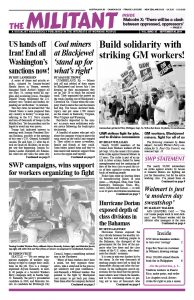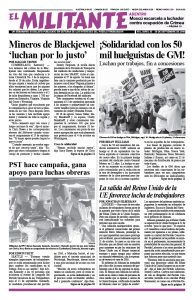October 3, 1994
ROSETOWN, Saskatchewan — Unionized since 1936, the Saskatchewan Wheat Pool, Canada’s largest grain-handling company, had never been struck by its employees. But after months of rancorous negotiations marked by the big cooperative’s demands for contract concessions, the Grain Services Union set up picket lines September 7. The GSU represents 1,800 Wheat Pool workers.
With Saskatchewan harvest operations in full swing, the union aims to shut down the cooperative’s entire elevator system. Contract provisions involving seniority rights, hours of work, use of part-time workers, and job security are under attack. A key issue in the strike is management’s decision to contract out construction of a new generation of mammoth concrete elevators to nonunion firms. More than 100 GSU construction workers will lose their jobs.
October 3, 1969
DETROIT — Students at the University of Michigan and local Ann Arbor antiwar activists gave a rocket-like thrust to the upcoming fall offensive. The Ann Arbor New Mobilization Committee propelled thousands into action over what normally would have been a routine football weekend.
While people inside the stadium were watching Michigan beat Vanderbilt, activists were gathering at the main exit gates of the stadium readying themselves to lead an antiwar march through the streets a mile and a half to a rallying spot in the middle of the campus.
People had been leafleted earlier as they entered the stadium and a sizable march was expected. But only the boldest thought that over 15,000 would join!
The police, who had brutally suppressed students and street people last summer, obligingly stopped traffic for the marchers.
September 30, 1944
The California bosses have launched a new all-out open shop drive. They are now campaigning for the adoption of the so-called “Right to Work” amendment to the California constitution, sponsored by the Merchants and Manufacturers Association of Los Angeles, which aims to outlaw the union shop.
The open shop drive in California follows the pattern established in a number of states, which have adopted vicious anti-labor laws in the recent period.
To ward off the assault of Big Business the labor movement must be rallied in independent struggle on both the economic and political field. On the order of the day in California is the calling of a state-wide conference of all unions, regardless of affiliation, to draw up a program of action around which the ranks of organized labor can be mobilized against the open-shop union haters.

